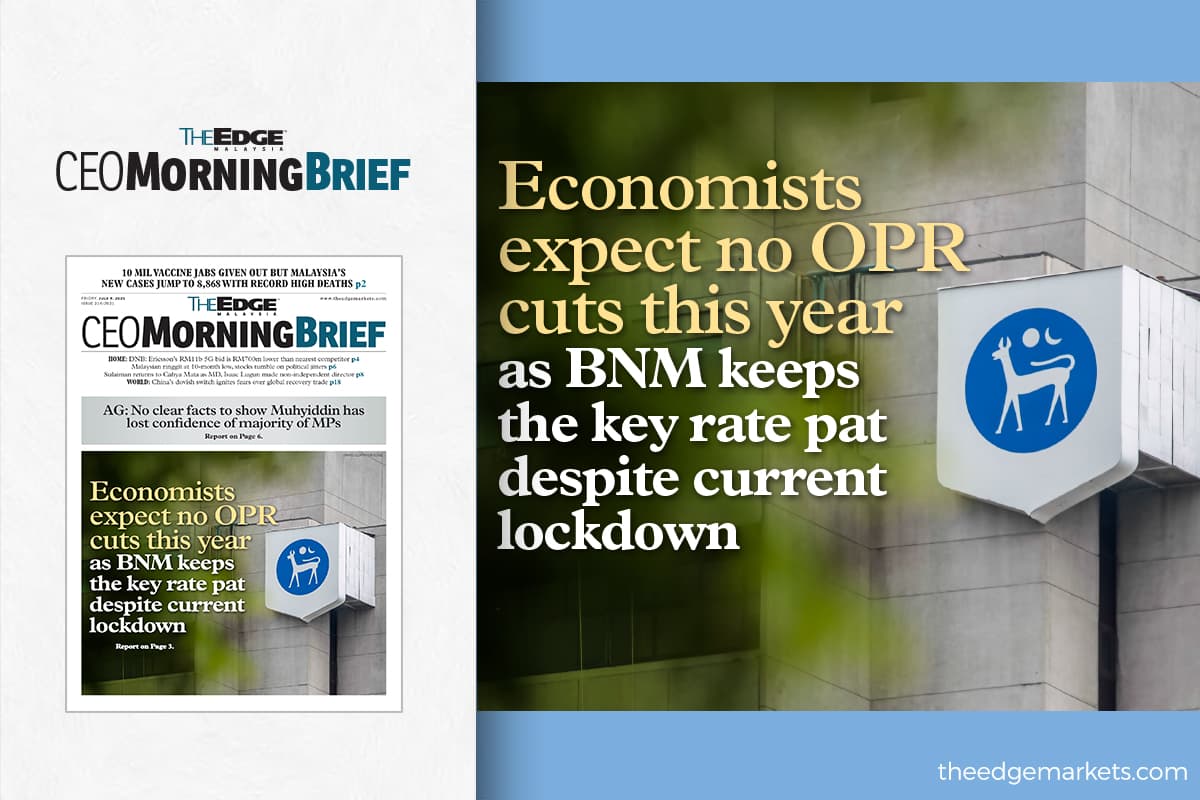
KUALA LUMPUR (July 8): Economists are expecting no change to Malaysia’s overnight policy rate (OPR) this year, following Bank Negara Malaysia (BNM)’s decision to maintain the key policy rate at 1.75% on Thursday, despite the potential economic impact of the current nationwide lockdown.
In its Monetary Policy Statement, the Central Bank said the current stance of monetary policy remains appropriate and accommodative, adding that the present fiscal and financial measures will continue to cushion the economic impact of the pandemic on businesses and households, while also supporting economic activity.
In a note, HSBC Global Research ASEAN chief economist Joseph Incalcaterra said it is clear that BNM was comforted by the fact that the measures outlined would continue to cushion the economic impact, which Incalcaterra noted as “new language that was added to defend the current monetary policy stance”.
“That said, the Central Bank also added language to reflect the lingering downside risks to growth, largely stemming from ‘factors that could lead to a delay in the easing of containment measures’ which could ‘undermine the growth recovery’,” he said.
While this could be interpreted as a dovish signal, Incalcaterra said it is a very modest one.
Following the month-long nationwide lockdown and the extension into July of enhanced restrictions in parts of Selangor and Kuala Lumpur, he said containment measures are likely to gradually ease going forward.
The economist also noted that restrictions in six States, which have met vaccination and ICU usage thresholds, have been eased, adding that policymakers may feel more comfortable in easing restrictions if case numbers stop rising.
“Most importantly, we believe BNM has made it clear in today’s meeting that it does not believe monetary policy is the best tool to respond to downside risks at this stage in the pandemic, unless conditions were to deteriorate materially from here — which is unlikely.
“We expect BMN to keep the policy rate unchanged at 1.75% through end-2022,” he said.
UOB Malaysia senior economist Julia Goh said the unchanged OPR was widely expected, noting that 19 out of 21 analysts polled by Bloomberg had projected a rate pause.
Having said that, she noted that BNM continues to leave the door open for a possible cut, as the Central Bank cited the future stance of monetary policy will remain data dependent, given the uncertainties surrounding the pandemic.
However, Goh sees limited room for further easing given the US Federal Reserve’s hawkish stance, other Central Banks’ readiness to normalise their respective monetary policy, and the global inflation, which continues to creep up.
And barring any political upheaval, she said the national vaccination programme is progressing well towards its 10% target for the transition into the second phase of the National Recovery Plan (NRP), coupled with the government’s plan to expand nationwide healthcare capacity to alleviate any shortages.
“More vaccines are scheduled to be delivered to Malaysia this month to further expedite the national immunisation programme. Currently, six States, namely Penang, Pahang, Perak, Kelantan, Perlis and Terengganu, have been allowed to transition into the second phase of NRP with more States expected to join the crowd by the end of July.
“Therefore, we stick to our view that the OPR will be kept steady at 1.75% for the rest of the year,” Goh said.
Similarly, MIDF Research expects BNM to maintain rates this year, though it noted that the Central Bank still has room to lower the OPR.
However, it said any reduction will depend on the length of the lockdown, as any further extension to the current lockdown will adversely affect the strength of Malaysia’s economic growth.
“Going forward, with additional fiscal support, the progress in vaccination, and eventually the relaxation of restrictions on the economy, we expect activity will pick up later this year. Based on this expectation, including the anticipation for a more moderate inflation in the coming months, we see less need for BNM to cut OPR,” the research house said.
To receive CEO Morning Brief please click here.